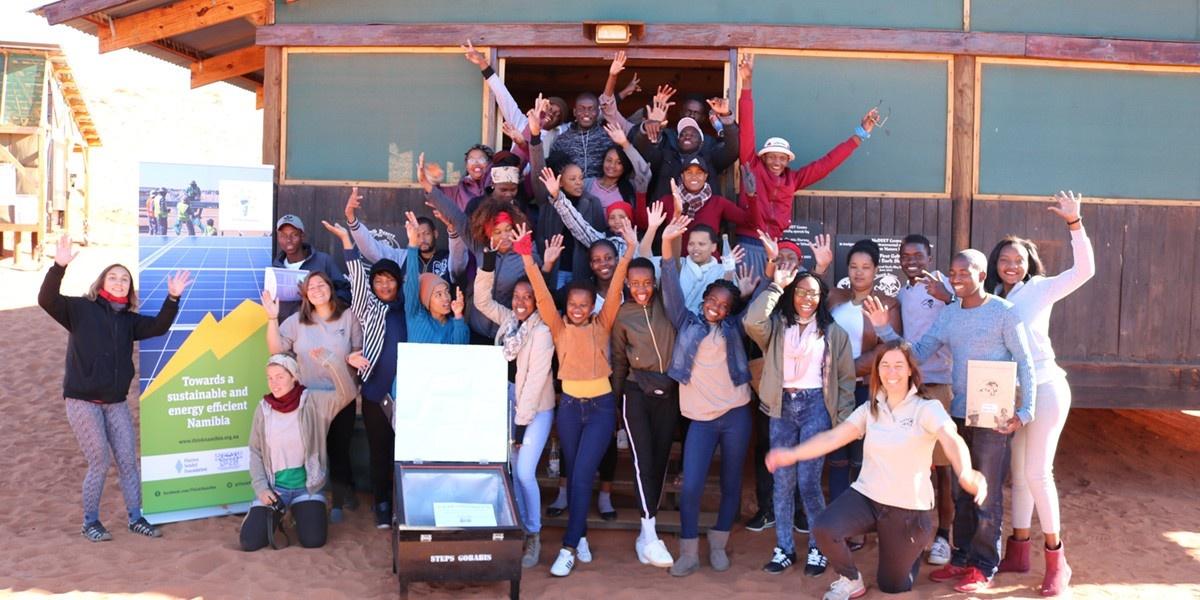Youth empowered on environmental sustainability
By Selma Shiwaya
A group of twenty-nine young people from seven regions across the country took part in a Solar Cooking and Sustainable Living workshop that recently took place at the Namib Desert Environmental Education Trust (NaDEET) Centre in the NamibRand Nature Reserve.
Participants from Erongo, Karas, Hardap, Omaheke, Oshana, Omusati, Khomas and Kunene were part of the workshop that was hosted by the Hanns Seidel Foundation’s Promoting Renewable Energies in Namibia (PREN) project in partnership with NaDEET, National Youth Council of Namibia (NYCN) and Nedbank Namibia.
The workshop aimed to provide hands-on experiential learning to young people in a desert environment and to empower them to practice what they have learned. “This workshop aimed to make a considerable impression on the participants and inspire them to integrate the principles of sustainability into their daily lives,” said Rodney Seibeb, the PREN project coordinator.
Participants attended seminars on eco-entrepreneurship, energy efficiency, waste management, light pollution and sustainable consumption to motivate them to adopt sustainable lifestyles. Moreover, participants took part in a biodiversity dune walk designed to give young people knowledge of the desert ecosystems.
One of the participants, Pinehas Iyambo lauded the organisers and sponsors of the workshop for an informative, educational, exciting, educational experience saying that the solar cooking equipment and the cultural diversity impressed him. “This was an extremely worthwhile initiative and I will definitely start living a sustainable life by using less water, implementing the 3 Rs (Reduce, reuse, recycle), replace incandescent light bulbs with LED bulbs and supporting the Zero Plastic Namibia initiative,” he said.
A 25-year-old Maria Aukongo from Oshana Region says that during the four days she experienced the reality of living sustainable in a household. “I am an Environmentalist and passionate about saving the earth, but I must say that I have not been doing as much. Some aspects are so simple such as carrying your own shopping bag to the store or using a cup when brushing your teeth,” she narrated.
The five-day workshop ended with a debate on the relevance of the Paris Climate Agreement. To most participants the Paris climate agreement was news to them however, for Maria it was a different case, as she had already known about the Agreement although she knew very little about it until the debate.
According to Seibeb, the debate on the Paris Climate Agreement was necessary as it forms part of the PREN project objectives. “The PREN project was established to implement the Paris Agreement on the grassroots level hence the necessity for participants to know what the agreement entails. This Agreement is global and can, therefore, not remain as such. Efforts have to be made on the grass root level to ensure that the impacts of the Agreement are felt on the grass roots level,” he explained.
“Most participants liked the debate and it served the right purpose because prior to that only one participant knew about the agreement and them having to analyse the content for and against helped them comprehend the agreement better,” added Seibeb.
During the workshop participants were also lectured on eco-entrepreneurship to enable them take on green entrepreneurship ideas as a way of generating wealth while conserving the environment.
Maria admitted that the workshop has instilled so much knowledge on environmental sustainability and would like to share it with her fellow youth through an empowerment challenge. “I will be starting an empowerment chain challenge, by firstly up cycling a waste material with an inspirational note. The person who receives the note will then have to up cycle and pass on the challenge. I believe this would create awareness on the importance of recycling and up cycling waste materials and how easy it is to save our planet by making each day an earth day,” she explained.
The workshop was attended by a diverse group of participants including university graduates, grade 10 certificate holders, environmental activists, eco-entrepreneurs and person with a disability.
In order enable the participants to practice what they have learned in their daily lives, the Hanns Seidel Foundation sponsored a solar oven valued at N$ 2500. To give all participants a fair chance, a raffle competition was held and the solar oven was won by one of the participants from Hardap Region, Cha-rize Pienaar.
When you subscribe to the blog, we will send you an e-mail when there are new updates on the site so you wouldn't miss them.
